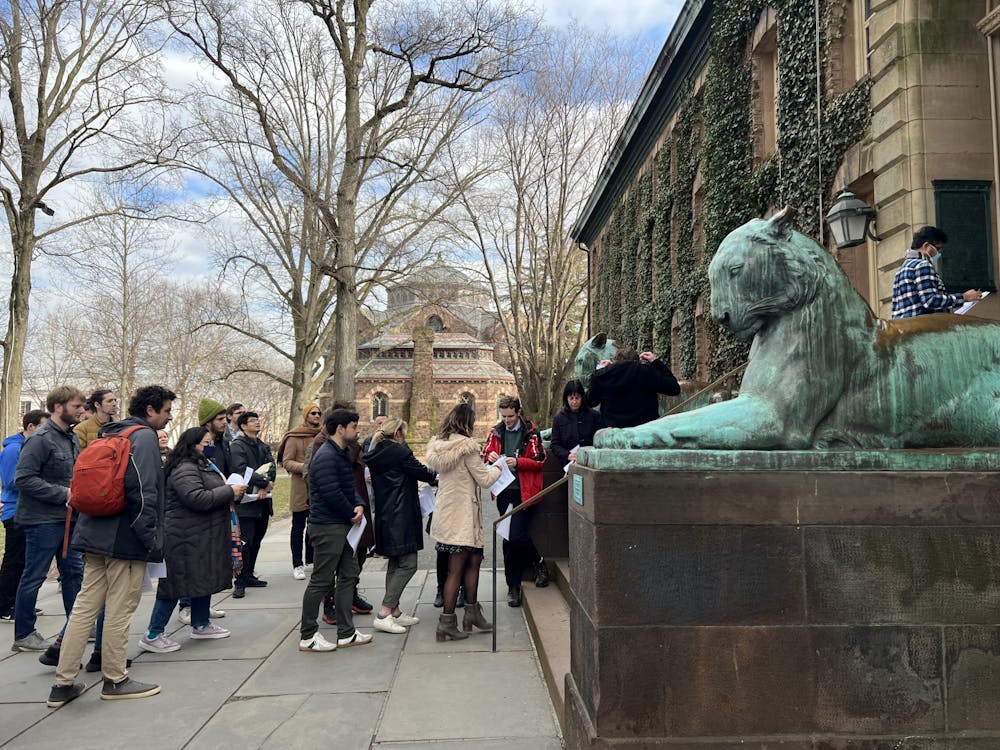The following is a guest contribution and reflects the authors’ views alone. For information on how to submit a piece to the Opinion section, click here.
In October, postdocs attempted to start negotiating our first ever contract as a union. Our bargaining goals — which have been ratified by the majority of our members — have served as the foundation to some truly transformative proposals. These proposals include: increasing the minimum salary with annual increases to keep up with cost of living, a housing stipend to ensure that we are not rent burdened, and two-year contracts with protections against early dismissals.
However, despite having two scheduled bargaining sessions, we have yet to actually sit at the table to discuss any of these proposals because of disagreements over open bargaining. Open bargaining is the foundation for member engagement and participation required to win proposals like these. The University must allow for observers and start discussing our proposals in a manner that is transparent and participative — an academic standard that many postdocs want and have clearly indicated by signing this petition.
Princeton’s resistance to the presence of observers is a break from many academic union negotiations. At Harvard, Weill Cornell, Mt Sinai, Columbia University, and the University of Washington, there are no limits on observers. Unit members at some universities, like Harvard, even have the option to join discussions through Zoom.
Historically, big wins for academic unions — especially around salary and housing — are not just the result of logical arguments or well-founded data, but the culmination of months of collective action, including town halls, department meetings, rallies, and strikes.
After a year of bargaining and setting a strike deadline during a meeting of over 100 postdocs, Mount Sinai achieved the highest minimum salary for postdocs in the country. At Dartmouth, graduate student workers won a contract with salary increases that keep pace with the Consumer Price Index — i.e. a cost of living adjustment — after being on strike for four months. At Stanford, after a year of bargaining and a strike authorization vote, graduate student workers just tentatively agreed to a contract ensuring that graduate workers’ salaries increase at the same or higher rate as university housing costs.
Open bargaining, which usually includes having unit members present as observers in sessions, emailing updates, and maintaining public trackers, is the foundation of this collective action. It is the main way members who are not part of the bargaining team can continue to actively participate in the bargaining process, keeping us updated, allowing for input on counter-proposals, and holding our own bargaining team accountable.
More broadly, participating in open bargaining gives members a sense of ownership in the process that is at heart of a union, building their trust and willingness to take further action. Additionally, seeing firsthand their employer’s behavior and refusal to engage with reasonable demands — as the authors witnessed in the first two bargaining sessions — motivates workers to act when it becomes clear they will not win demands simply by making convincing arguments.
But Princeton’s discussions of ground rules, like open bargaining, which are not mandatory subjects of bargaining, have delayed the start of negotiations. And in the first two attempted bargaining sessions, University representatives refused to enter the room because of the number of observers present, all of whom were their own employees. Initially, they proposed disallowing observers altogether and have since moved to “allowing” five observers.
Those of us who have been part of graduate student worker unions have witnessed firsthand how open bargaining fosters greater participation, ensures transparency, and strengthens accountability. At the University of California, for example — where two of us took part in the 2022 contract negotiations as graduate student workers — hundreds of graduate workers, postdocs, and staff researchers joined bargaining sessions to discuss salary and cost of living adjustments, which led to the largest-ever strike in U.S. higher education and resulted in a wage increase of at least 20 percent for postdocs.
This is why we support open bargaining. Princeton has not provided a reason as to why they will allow only five observers, and refuses to compromise on this number despite our bargaining team’s efforts to assuage any concerns about keeping bargaining orderly, including keeping observers to room limit, or to settle for just 10 observers for the second session and not allowing recordings. These are significant compromises, considering that our bargaining unit consists of nearly 1,000 postdocs who deserve the option to witness what is being discussed and how their contract negotiations are being handled.
We see the refusal to allow observers in the bargaining room as part of a more widespread University discomfort with transparency, and in our case, a power play that stalls bargaining and undercuts our collective power.

As with contract wins, open bargaining will only be won through member participation. If you are a postdoc, sign the open bargaining petition, show up to the Open Bargaining demonstration at 10 a.m. on Dec. 3, and sign up to be an observer at future bargaining sessions.
Paola Estrada is a postdoc in Molecular Biology and a member of the Housing working group.
Jessica Ng is a postdoc in the High Meadows Environmental Institute and a member of the Intellectual Property Working Group.
Nusrat Molla is a postdoc in the Andlinger Center for Energy and Environment and a member of the Housing Working Group.
Omar Hagrass is a postdoc in Operations Research and Financial Engineering and a union organizer.
Mostafa Abdou is a postdoc in the Princeton Neuroscience Institute and a member of the Contract and Grievance Working Group.
Merihan Alhafnawi is a postdoc in Mechanical and Aerospace Engineering and a union organizer.








